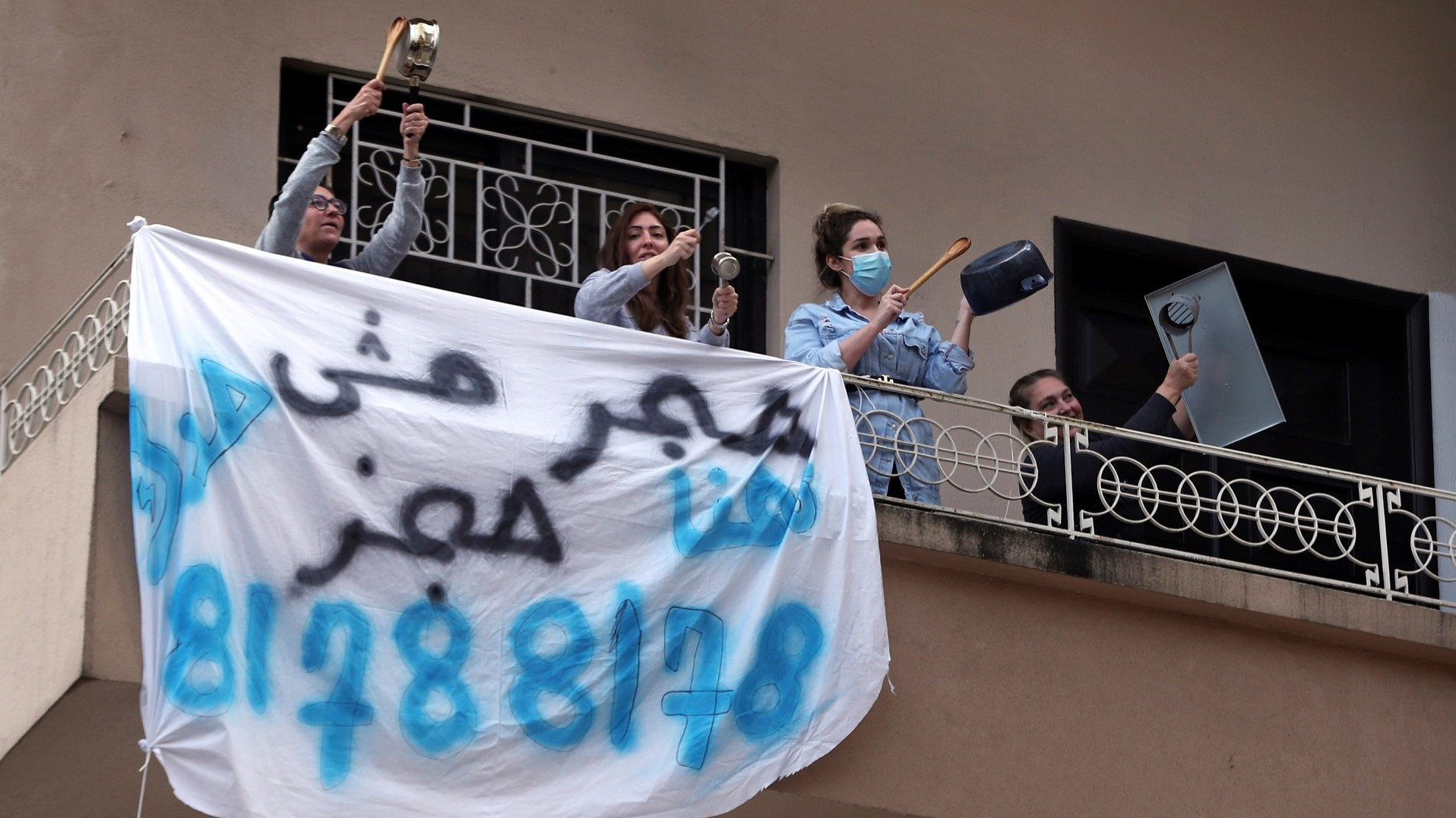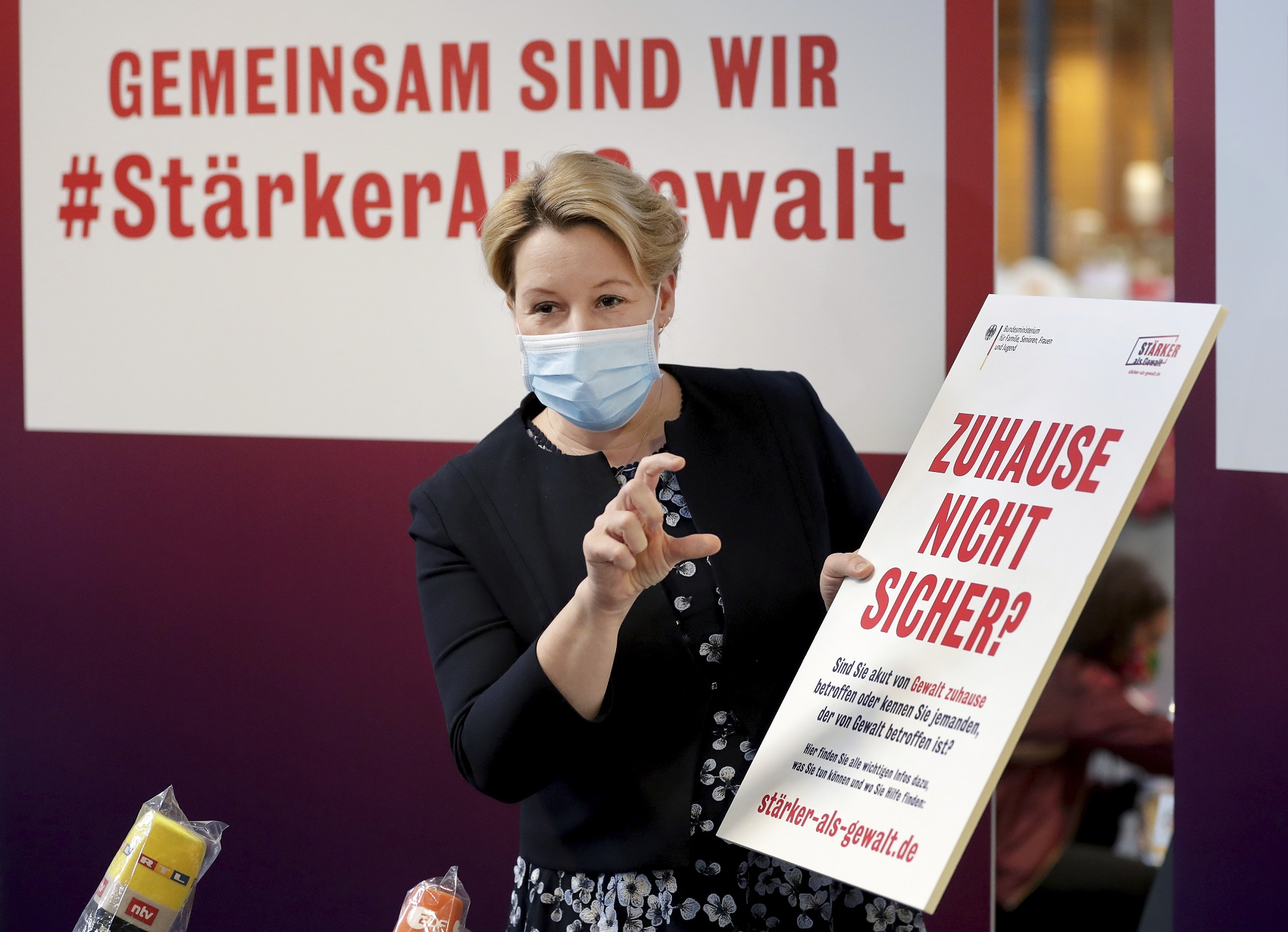
Women bang spoons against pots and pans next to a banner in Arabic that reads 'lockdown not lockup' with the number of a domestic violence hotline as part of a solidarity campaign in Beirut, Lebanon, April 16, 2020. /AP
Women bang spoons against pots and pans next to a banner in Arabic that reads 'lockdown not lockup' with the number of a domestic violence hotline as part of a solidarity campaign in Beirut, Lebanon, April 16, 2020. /AP
Fears that domestic abuse would spike during lockdown measures imposed as a result of the COVID-19 epidemic are starting to become reality with women's groups and authorities reporting a hike in cases and calls to helplines since early March.
At the start of the crisis, experts warned that stay-at-home measures, with couples and families confined together in close quarters with little opportunity to go out, could worsen already volatile domestic situations.
Combined with extra stress from working at home and homeschooling children, possible job loss and financial problems as well as anxiety over an unprecedented global health emergency, this created a dangerous cocktail, they said.
Read more:
Stress, isolation, COVID-19: A nightmare cocktail for domestic abuse
Domestic abuse rises amid lockdown in Mexico
On March 31, Lorena Quaranta, a 27-year-old medical student in Messina, southern Italy, was strangled to death by her boyfriend. "She gave me coronavirus so I killed her," he told investigators. Tests later found they were both negative.
Between April 1 and 18, the number of calls to Italy's 1522 domestic violence hotline went up dramatically to 1,039, compared to 397 in the same period last year, Equal Opportunities and Family Minister Elena Bonetti said.
In France, the interior ministry's domestic abuse platform Arretons les violences (Stop the violence) received five times as many reports as usual during the lockdown, State Secretary for Gender Equality Marlene Schiappa said on April 16.
A Lebanese NGO that deals with gender equality and domestic abuse, Abaad, said twice as many calls had been made to its hotline by mid-April -- 578 in total -- as in all of 2019.
In Brazil, a Rio de Janeiro judge specializing in domestic violence, Adriana Mello, has estimated that domestic abuse cases have gone up 40-50 percent.
In neighboring Colombia, calls to a national women's hotline shot up by almost 130 percent in the first 18 days of quarantine, according to government figures cited by Reuters.
Meanwhile in Mexico, women's shelters have seen an 80-percent increase in emergency calls, the daily El Universal reported this week.

German Minister for Family Affairs, Senior Citizens, Women and Youth, Franziska Giffey, poses with a poster raining awareness about domestic abuse in Berlin, Germany, April 29, 2020. /AP
German Minister for Family Affairs, Senior Citizens, Women and Youth, Franziska Giffey, poses with a poster raining awareness about domestic abuse in Berlin, Germany, April 29, 2020. /AP
China experienced a hike in domestic violence at the height of its lockdown too, with one NGO in Hubei Province, the epicenter of the epidemic, reporting that cases in Jianli County and Qianjiang City doubled in February compared to the previous year, with over 300 cases as of March 6, Global Times reported.
In Spain, the UK, Malaysia, Germany and the U.S., helplines have reported being busier than usual over the past two months. And the number of women seeking places in shelters has also gone up.
According to a survey published on Tuesday by Women's Aid, a UK charity, 67 percent of women currently experiencing abuse said the violence had worsened since the start of the epidemic. 72 percent added that their abuser now had more control over their life.
"I am reliant upon my abuser to get food and medication... This is being used against me," the Survivor Survey cited one woman as saying.
"It's hell on earth living 24/7 now with my abuser and I can't get out to escape and put distance between us when I feel tension rising," said another.
Faced with a new situation where women are often confined with their abuser and unable to easily seek help, governments and help groups have expanded their efforts, setting up email and Whatsapp helplines alongside the traditional phone ones so that victims can make silent contact with them. Countries like Spain, France, Argentina and Chile have introduced codewords, with which women can alert staff at their pharmacy if they need help.

A Twitter post by Chile's Ministry of Public Works on April 30, 2020 explaining how domestic abuse victims can seek help at their pharmacy under the codeword #Mascarilla19. /CGTN screenshot
A Twitter post by Chile's Ministry of Public Works on April 30, 2020 explaining how domestic abuse victims can seek help at their pharmacy under the codeword #Mascarilla19. /CGTN screenshot
Still, 241 women in Mexico have been killed during the quarantine, Red Nacional de Refugios, the national network of shelters, tweeted over the weekend.
In Turkey, the We Will End Femicide platform tallied at least 17 women murdered by a current or former partner in March.
Quaranta, the Italian student murdered by her boyfriend, was one of eight women killed since COVID-19 first hit Italy in late February, according to the daily Corriere della Sera.
There are also concerns that while the number of calls to helplines has gone up, formal complaints have dropped during the epidemic in many places, including Germany, France, Chile and parts of the U.S.
This does not mean that abuse is not taking place but simply that the victims may be unable to seek help at this time, UN Women and authorities have cautioned.
A report by the UN Population Fund (UNFPA) on Monday warned that things could get worse globally.
"If the lockdown continues for six months, 31 million additional gender-based violence cases can be expected," it said, citing "stay-at-home orders and movement restrictions... mounting household tensions and economic stresses."
"For every three months the lockdown continues, an additional 15 million additional cases of gender-based violence are expected," it added.